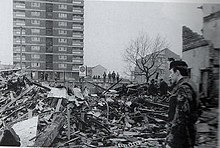| McGurk's Bar bombing | |
|---|---|
| Part of the Troubles | |
 A British soldier surveys the aftermath of the bombing | |
| Location | Corner of North Queen Street and Great George's Street, Belfast, Northern Ireland |
| Coordinates | 54°36′26.7″N 05°55′49.7″W / 54.607417°N 5.930472°W |
| Date | 4 December 1971 20:45 (GMT) |
| Target | Irish Catholics |
Attack type | Time bomb |
| Deaths | 15 |
| Injured | 17 |
| Perpetrator | Ulster Volunteer Force (UVF) |
On 4 December 1971, the Ulster Volunteer Force (UVF), an Ulster loyalist paramilitary group, detonated a bomb at McGurk's Bar in Belfast, Northern Ireland, frequented by Irish Catholics–nationalists.[1] The explosion caused the building to collapse, killing fifteen Catholic civilians—including two children—and wounding seventeen more. It was the deadliest attack in Belfast during the Troubles.[2]
Despite evidence to the contrary, the British security forces asserted that a bomb had exploded prematurely while being handled by Irish Republican Army (IRA) members inside the pub, implying that the victims themselves were partly to blame. A report later found that the Royal Ulster Constabulary, the police force in Northern Ireland at the time, were biased in favour of this view and that this hindered their investigation. The victims' relatives allege that the security forces deliberately spread disinformation to discredit the IRA. In 1977, UVF member Robert Campbell was sentenced to life imprisonment for his part in the bombing and served fifteen years.[3][4]
The bombing sparked a series of tit-for-tat bombings and shootings by loyalists and republicans, which contributed to making 1972 the bloodiest year of the conflict.
- ^ "Daughter recalls bar bomb horror". BBC News (3 December 2001). 3 December 2001. Retrieved 6 May 2008.
- ^ Taylor, Peter (1999). Loyalists. Bloomsbury Publishing. p. 88. ISBN 0-7475-4519-7.
- ^ Belfast Telegraph: McGurk's bar massacre victim confronts killer, 01 March 2011
- ^ "Man arrested over 1971 McGurk's pub bombing". The Irish News. May 2014.